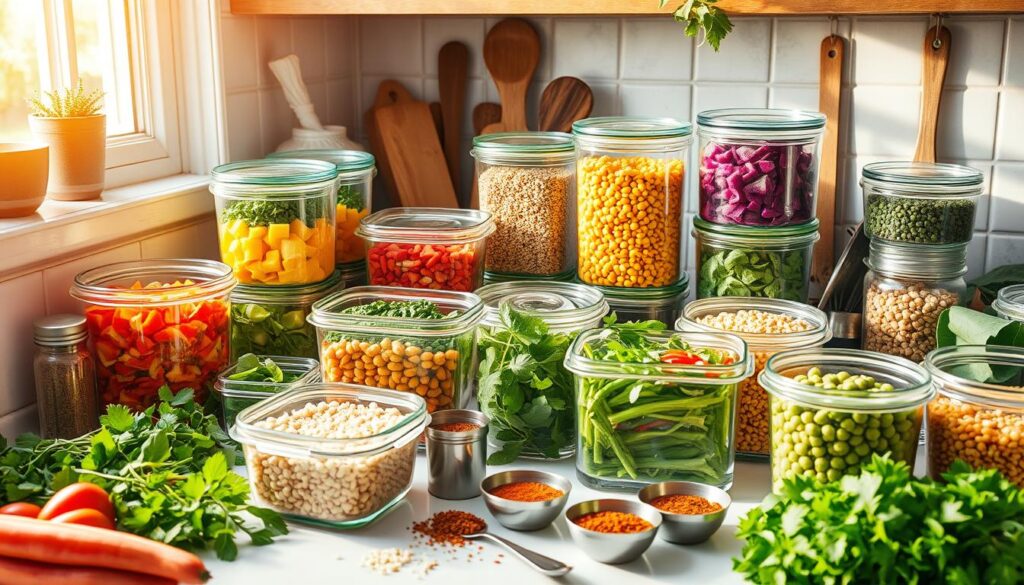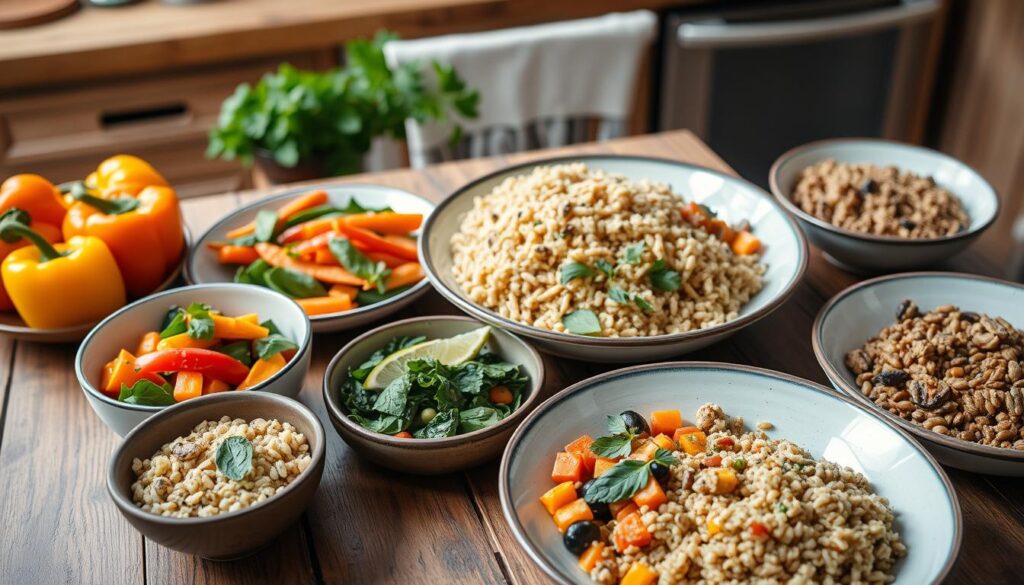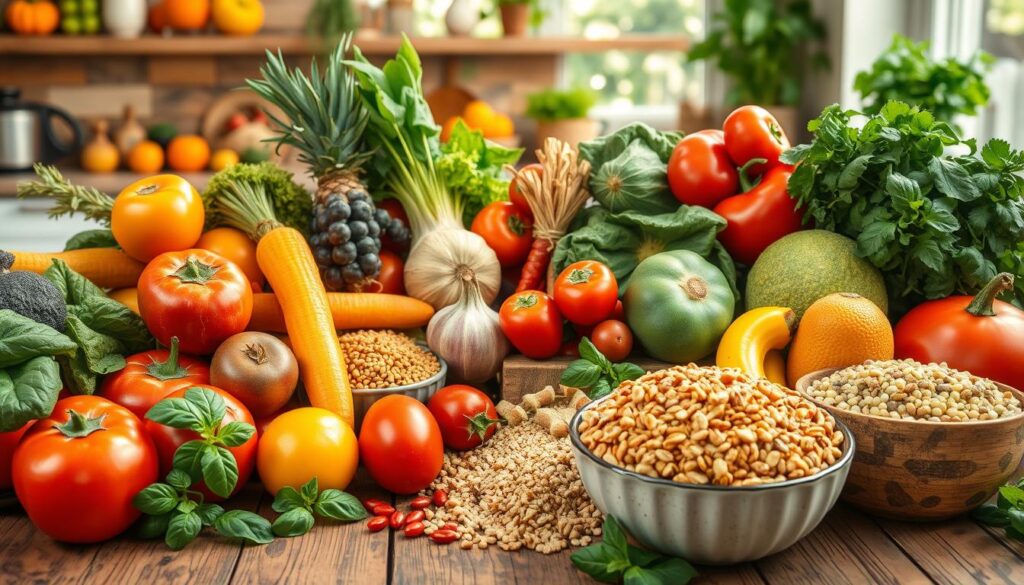It’s hard to eat healthy when money is tight. But, a plant-based diet might be the answer. It’s all about eating foods from plants and can be very cheap.
A plant-based diet means eating lots of fruits, veggies, and whole grains. You also eat nuts, seeds, and some legumes. It’s good for your health and the planet.
Good news: you can eat plant-based on a budget. With smart planning and shopping, you can save money. This guide will help you eat healthy for less and enjoy your plant-based journey.
Key Takeaways
- A plant-based diet can be both nutritious and affordable
- Proper planning allows for a cheaper grocery bill compared to diets heavy in animal products
- Affordable plant-based protein sources include edamame, beans, lentils, chickpeas, tofu, and tempeh
- A plant-based diet is beneficial for the environment, with lower greenhouse gas emissions and less water and land usage
- Cooking and eating a plant-based diet at home is more cost-effective than dining out
Understanding Plant-Based Diet Basics
A plant-based diet focuses on foods from plants. This includes fruits, veggies, whole grains, legumes, nuts, and seeds. It might also let you eat a little bit of animal products like dairy or eggs.
A whole-food, plant-based diet (WFPB) is stricter. It doesn’t include animal products, mock meats, oils, added sugar, or processed foods.
What Defines a Plant-Based Diet
A plant-based diet puts plants first. It can range from vegan to eating a bit of animal products. The main thing is to eat mostly whole, plant-based foods.
Difference Between Plant-Based and Whole Food Plant-Based
Plant-based and whole-food, plant-based diets both focus on plants. But, a whole-food, plant-based diet is stricter. It doesn’t allow animal products, processed foods, or foods with added oils or sweeteners. It’s all about eating whole, natural plant foods.
Health Benefits of Plant-Forward Eating
Studies show plant-based diets are good for you. They help with weight, lower cholesterol, and reduce heart disease risk. They also are better for the planet, needing less water and land than animal-based diets.
“A 2020 review of 19 intervention studies found that participants assigned to plant-based diets in each study lost weight.”
Choosing a plant-based diet, flexible or strict, is good for you and the planet. It can make a big difference in your health and the environment.
Getting Started with Budget-Friendly Plant-Based Shopping
Switching to a plant-based diet doesn’t have to cost a lot. You can find a budget plant-based grocery list that’s easy on your wallet. Look for shelf-stable, versatile items that are the base of your budget-friendly plant-based meals.
Begin by buying affordable basics like beans, peas, lentils, and potatoes. Also, get carrots, corn, onions, garlic, frozen veggies, and fruit. Don’t forget bananas, oranges, tomato sauce, peanut butter, oatmeal, brown rice, and whole-grain pasta. These affordable vegan ingredients help make many tasty budget plant-based dishes.
Plan your budget plant-based grocery list around cheap plant-based foods like beans and potatoes. Keep track of your spending and stick to your budget. Meal planning for the week can help save money. Cooking at home instead of eating out also cuts costs, making a budget-friendly plant-based lifestyle possible.
“Incorporating affordable vegan ingredients into your diet is a great way to enjoy the health benefits of plant-based eating without breaking the bank.”
With a bit of planning and creativity, you can make a budget plant-based grocery list that’s tasty, healthy, and budget-friendly. Choose cheap plant-based foods that fit your lifestyle and budget. Start a plant-based journey that’s good for your body and your wallet.
Essential Pantry Staples for Plant Based Diet on a Budget
Creating a plant-based pantry doesn’t have to cost a lot. Focus on affordable grains, legumes, fruits, veggies, and spices. This way, you can make tasty and healthy meals without spending a lot.
Affordable Grains and Legumes
- Whole grains like brown rice, oats, and quinoa are full of fiber and carbs.
- Lentils, chickpeas, and black beans are high in protein, making meals more filling.
- Keep a variety of these affordable vegan grains and legumes for many recipe options.
Budget-Friendly Fruits and Vegetables
Fill your pantry with cheap produce for more nutrition and taste. Stock up on seasonal, budget-friendly produce like bananas, apples, carrots, and frozen options. They’re as nutritious as fresh ones.
Money-Saving Seasonings and Condiments
Spices and condiments add flavor to your plant-based dishes. Affordable options like garlic powder, onion powder, dried herbs, lemon juice, vinegar, and mustard make simple ingredients taste great.
With a pantry full of cheap plant-based pantry staples, you can make many healthy and affordable meals. Enjoy the flavors of a plant-based diet without spending too much!
Smart Shopping Strategies for Plant-Based Ingredients
Starting a plant-based diet doesn’t have to cost a lot. With smart shopping, you can eat healthy and save money. Here are some ways to buy plant-based foods without spending too much.
Try using dry beans instead of canned ones. Dry beans save up to 80 cents per pound. This means a family of four can save nearly $80 a year.
Buy grains, cereals, nuts, and spices in big amounts. This helps avoid extra packaging costs.
Look for fruits and veggies that are in season. They are usually cheaper. Use frozen options for the same nutrition at a lower cost. Skip pre-chopped or pre-packaged foods to save money and avoid waste.
Check out local farmer’s markets, ethnic stores, and discount shops. They often have great deals on plant-based foods. Always clip coupons and watch for sales on your favorite items.
With a bit of creativity and smart shopping, you can eat plant-based without spending a lot. Follow these tips to enjoy a healthy, affordable plant-based lifestyle.
Affordable Plant-Based Protein Sources
Going vegan doesn’t have to cost a lot. There are many protein sources that are cheap but still pack a punch. Let’s look at some affordable plant-based proteins you can add to your meals.
Legumes and Beans
Legumes and beans are full of affordable plant proteins. Black beans have about 7 grams of protein for just 110 calories. Lentils give you 10 grams of protein for 130 calories. You can find them canned or dried and add them to soups and stews.
It’s good in many dishes. Tempeh, with 13 grams of protein per 100 grams, is perfect for stir-fries and sandwiches.
Seeds and Nuts on a Budget
Don’t forget about affordable seeds and nuts as protein sources. Sunflower seeds have 7 grams of protein per 1/4 cup. Enjoy them as a snack or in salads. Chia seeds have 17 grams of protein per 100 grams. They’re great in smoothies and oatmeal.
| Protein Source | Protein Content (per 100g) | Estimated Cost per Serving |
|---|---|---|
| Lentils | 23g | $0.35 for dried lentils |
| Split Green Peas | 23g | $0.28 for dried split peas |
| Seitan | 19g | N/A |
| Chia Seeds | 17g | N/A |
| Tempeh | 13g | N/A |
| Tofu | 11g | $0.56 per serving |
| Edamame | 11g | $0.53 for frozen edamame |
| Chickpeas | 8g | $0.28 per can |
| Peas | 6g | N/A |
By using these affordable plant proteins, you can eat well without spending a lot. Try different cheap vegan protein sources to find what you like best.
Meal Planning and Prep Techniques
Starting a vegan or plant-based diet doesn’t have to cost a lot. With some planning and prep, you can make tasty, cheap meals. Focus on affordable ingredients and smart prep methods.
Plan meals around cheap items like beans, lentils, whole grains, and frozen veggies. Cook big batches of these ahead of time. They can be used in many dishes all week. This saves time and money by reducing waste.
Make a flexible meal plan and shopping list. This helps you find deals, use seasonal produce, and buy in bulk. Also, get creative with leftovers. Turn extra roasted veggies into soup or use cooked beans in a burrito bowl.
Meal prep is great for saving money on plant-based meals. Spend a few hours on the weekend chopping, roasting, and cooking. This makes cooking easy during the week and keeps healthy, cheap meals ready.
A plant-based diet is naturally cheap because it focuses on whole foods. By using these vegan meal prep and budget plant-based meal planning tips, you can enjoy tasty, affordable vegan recipes. You won’t have to spend a lot or give up on health.

Budget-Friendly Plant-Based Breakfast Ideas
Eating a healthy, plant-based breakfast doesn’t have to cost a lot. You can make quick oatmeal or prepare meals ahead of time. These ideas are both affordable and nutritious, helping you start your day right without spending a lot.
Quick Oatmeal Variations
Oatmeal is a great and cheap breakfast choice. Try making Overnight Oats with Apples and Cinnamon for a quick breakfast that’s only $0.41 per serving. Or, make a big batch of Homemade Muesli with oats, nuts, and dried fruit for a customizable and affordable option.
Make-Ahead Breakfast Options
Make breakfast ahead of time to save money and time. Bake a batch of Oatmeal-Date Pancakes to reheat all week for just $0.43 per serving. Another idea is Sweet Potato Breakfast Bowls with muesli and fruit, a nutritious start for $0.49 per serving.
| Breakfast Idea | Cost per Serving |
|---|---|
| Peanut Butter & Banana Cookies | $0.41 |
| Peanut Butter & Banana “Sushi” | $0.43 |
| Chocolate “Nice” Cream | $0.49 |
| Black Bean Tacos | $0.91 |
| Hash Browns | $0.92 |
Adding these budget-friendly plant-based breakfast ideas to your routine can make mornings delicious and affordable.
Economical Lunch and Dinner Solutions
Eating vegan doesn’t have to cost a lot. You can make tasty cheap vegan lunch ideas and affordable plant-based dinners that are good for you and your wallet.
Try a Chickpea Pasta Salad for a yummy cheap vegan lunch. It has chickpea pasta for protein, crunchy veggies, and a tasty dressing. It’s both tasty and cheap.
Potato Burrito Bowls are another great lunch. They have roasted potatoes, black beans, corn, and your favorite toppings. It’s a filling and affordable plant-based dinner that’s easy to make ahead.
A Lentil Ragu is perfect for budget-friendly vegan meals at dinner. You can use it on pasta, as a potato topping, or in a plant-based shepherd’s pie. It’s versatile and delicious.
For a cheap vegan lunch or affordable plant-based dinner, make a Tex-Mex Pasta Salad. It has black beans, corn, and a zesty dressing. It’s colorful, satisfying, and won’t empty your wallet.

Adding these cheap vegan lunch ideas and affordable plant-based dinner options to your meals can save money. You’ll enjoy tasty and budget-friendly vegan meals without losing flavor or variety.
Money-Saving Batch Cooking Strategies
Trying vegan batch cooking can change your diet for the better. It saves time, money, and cuts down on waste. Here are some ways to save money with your plant-based meals.
Large-Batch Recipes
Begin by cooking big batches of things like brown rice, lentils, and chickpeas. These are full of protein and can make many tasty, cheap meals. Try making a big pot of chickpea curry stew with kale for several days.
Soups, stews, and casseroles are perfect for batch cooking. They’re filling and can be reheated on busy nights. Doubling or tripling recipes means you’ll have plenty of vegan meals ready to go.
Storage and Freezing Tips
Store your cooked meals in individual or family-sized containers. This makes it easy to grab a healthy meal anytime. Remember to label and date your containers for freshness.
Freezing leftovers is a great way to keep your meals fresh longer. It lets you enjoy your vegan dishes for weeks or months. Just thaw and reheat them carefully to keep the taste and texture good.
Vegan batch cooking can make your meal prep easier and cheaper. It lets you enjoy healthy, tasty meals all week. Start planning your recipes and storage today for a more affordable, stress-free vegan life.
Seasonal Shopping for Maximum Savings
Shopping for vegan food in season can really help you eat healthy without spending a lot. Buying what’s in season means you get great prices and taste. It’s a smart way to save money.
In summer, look for cheap tomatoes, zucchini, and berries. Winter is the time for carrots, potatoes, and citrus fruits. Going to the farmer’s market is a great way to find these at good prices.
If you have room, grow your own herbs or join a community garden. This way, you get fresh, cheap food all year. Canned and frozen veggies are also good and cheaper when fresh ones are scarce.
Plan your meals with seasonal fruits and veggies to eat well without spending too much. A little creativity and smart shopping can help you save money. You’ll enjoy the best tastes of the season.
| Seasonal Vegan Produce | Estimated Cost Savings |
|---|---|
| Tomatoes (summer) | Up to 50% off non-seasonal prices |
| Zucchini (summer) | 30-40% lower than winter prices |
| Berries (summer) | 25-35% savings compared to off-season |
| Carrots (winter) | 20-30% cheaper than summer prices |
| Citrus fruits (winter) | Up to 40% off non-seasonal options |
“Eating seasonally is not only better for the planet, but it can also save you a significant amount of money on your grocery bills.” – Nutrition Expert, Sarah Johnson
Seasonal vegan shopping is good for your wallet and the planet. You get fresh, tasty food all year. It’s a smart choice for your health and your budget.
Reducing Food Waste on a Plant-Based Diet
When you’re on a plant-based diet and watching your budget, cutting down on waste is key. You can use veggie scraps and store food right to save money. This way, you get more value from what you buy.
Make vegetable broth from veggie trimmings and peels. Freeze bananas that are too ripe for smoothies or baking. Use old greens in pesto or soups.
Keep fruits and veggies in the best spots to last longer. This stops them from going bad too soon.
Be creative with leftovers to make new meals. Use leftover veggies in frittatas or soups. This way, you save money and help the planet.


A Life-Changing Experience with This Weight Loss Supplement (Nagano Tonic)
I’ve always struggled with finding a weight loss solution that actually works for me. Like many, I’ve tried numerous diets, exercise routines, and supplements over the years—some worked for a short time, but nothing ever gave me long-term results. That was until I decided to try the weight loss supplement I found : Link to the Supplement.
From the moment I started using it, I noticed a difference. Not only did I feel more energized, but my cravings also became more manageable. The best part? I started seeing results much quicker than I anticipated! Over the course of just a few weeks, I noticed a significant reduction in belly fat and overall weight loss that I hadn’t been able to achieve before.
What makes this supplement stand out from all the others I’ve tried is how it supports me in my daily routine without any jitters or energy crashes. I’m able to stay focused and motivated, which has made it easier to stay on track with my diet and exercise plan.
This product truly exceeded my expectations, and I feel more confident and healthier than ever before. If you’re struggling with your weight loss journey like I was, I highly recommend giving this supplement a try. It’s been a game-changer for me, and I’m sure it can work wonders for you too!
Contant Them on email .. tonicnagano50@gmail.com
I’ve tried so many weight loss products over the years, but nothing worked like this supplement! Since I started using it, I’ve noticed a big difference in my energy levels and appetite control. In just a few weeks, I’ve lost weight and feel so much better. It’s been easy to stick with, and the results speak for themselves. Highly recommend this to anyone looking to make a real change!
wasn’t sure what to expect, but this weight loss supplement has really impressed me! After just a few weeks of use, I’ve already dropped a few pounds and feel more motivated to stay active. It’s helped curb my cravings and boosted my energy throughout the day. I’m excited to keep going and see even better results. Definitely worth trying!
Reach them on tonicnagano50@gmail.com
I was skeptical at first, but this supplement has truly made a difference in my weight loss journey. I’ve lost weight without feeling deprived or sluggish. My cravings are under control, and I feel more confident in my body. It’s easy to incorporate into my daily routine, and the results speak for themselves. I’m so glad I gave it a try!
Thanks David, i do use the link to make my purchase. you can get too here http://surl.li/iasppy
I’ve tried so many weight loss products, but this one has been by far the most effective. In just a few weeks, I’ve noticed a visible difference in my body and energy levels. It’s helped me stay on track without the constant hunger pangs and cravings. I’m really happy with my progress and can’t wait to see where I’ll be in another month!
This Nagano Tonic has been amazing! In just a few weeks, I’ve lost weight, feel more energized, and my cravings are under control. Highly recommend it!
Thats the link to purchase http://surl.li/iasppy